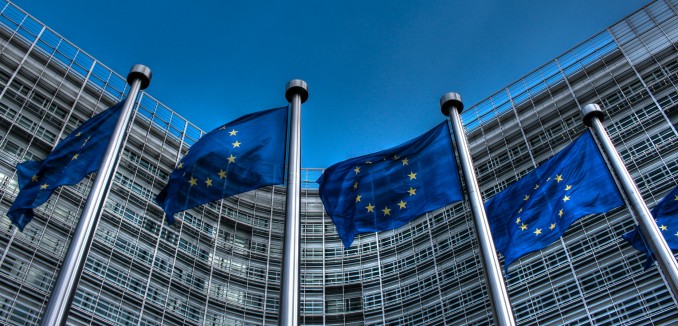Citing a concern that the European Union’s proposed guidelines to label goods produced by Israeli companies operating in the West Bank could “promote a de-facto boycott of Israel,” senators Kirsten Gillibrand (D – N.Y.) and Ted Cruz (R – Texas) on Monday released an open letter (.pdf), which was signed by 36 senators and addressed to the EU’s top diplomat, urging the European body to reconsider the discriminatory policy.
Writing to Federica Mogherini, the High Representative of the European Union for Foreign Affairs and Security Policy, the senators argued:
As allies, elected representatives of the American people, and strong supporters of Israel, we urge you not to implement this labeling policy, which appears intended to discourage Europeans from purchasing these products and promote a de-facto boycott of Israel, a key ally and the only true democracy in the Middle East. We believe strongly that these efforts are unwarranted, dangerous, and damaging to the prospects of a negotiated solution to [the Israeli-Palestinian] conflict.
The letter continued by outlining other problems with the labeling proposal, including its similarity to the Arab League boycott of Israel in the 1970’s and its acceptance of “the narrative” of the hard-line Boycott, Divestment, and Sanctions (BDS) movement.
We are also deeply concerned that enacting this policy would lead to the broader boycott of Israel. For decades, it has been the policy of the United States to oppose economic boycotts by other countries against Israel. In the 1970s, the United States Congress enacted legislation making it illegal for a U.S. company to comply with the Arab League boycott of Israel. This year, Congress has passed Trade Promotion Authority (TPA) legislation requiring the United States to discourage Europe from enacting any politically motivated policies that would boycott, divest from, or sanction Israel when negotiating the Transatlantic Trade and Investment Partnership. Differentiating between products made by Israeli companies creates a troubling precedent that could eventually lead to the type of activities that the TPA provisions aim to address.
At a time of significant instability in the region, it is deeply concerning to us that the EU is considering a proposal intended to impose more diplomatic and economic pressure on Israel. The proposed labeling guidelines play into the narrative of the Boycott, Divestment, and Sanction (BDS) movement, which is an effort to delegitimize Israel rather than promote a resolution of outstanding issues between Israel and the Palestinians. Far from advancing such a resolution, the proposed labeling would prejudge the outcome of future negotiations.
On Tuesday, Sen. Marco Rubio (R – Fla.), who was one of the 36 senators to sign the letter, wrote in the National Review:
The rule is grossly unjust. It makes a mockery of the EU’s claimed commitment to international law. It punishes Israel for Palestinian leaders’ repeated rejection of statehood offers and for their ongoing refusal to negotiate. In the midst of a new wave of Palestinian terror, the EU seeks to punish Israel while taking no action against Palestinians inciting and perpetrating murder. The rule requires products sold in Europe and produced in what the EU considers ‘Israeli-occupied territories’ to be specially labeled.
To illustrate the absurdity of this policy, produce grown in the hills outside Jerusalem will be specially labeled, but not produce grown in Gaza, which is controlled by a U.S.- and EU-designated terrorist organization. Remarkably, the EU’s labels will even apply to the Golan Heights, captured from Syria in a defensive war in 1967.
Rubio added that Palestinians “who work cooperatively with Israelis” are among those who are likely to be hurt by the labeling.
Last week, Isaac Herzog, head of the Israeli opposition party Zionist Union, called the EU’s proposal “a prize that Europe is bestowing for terror.” Also last week, former Israeli ambassador to the United States and Knesset member Michael Oren (Kulanu) protested the proposed labeling guidelines by marking European products in a Jerusalem grocery store.
In a paper (.pdf) published this past August, legal scholars Avi Bell and Eugene Kontorovich highlighted the selective and discriminatory nature of the EU’s labeling guidelines.
There are about 200 territorial sovereignty disputes worldwide, in many cases of which the EU does not accept sovereignty claims of the states which administer the territory in question. Among these territories are Western Sahara (controlled by Morocco), Kashmir (controlled in dif ferent parts by India, Pakistan and China), and many others. In many of these areas, the controlling state allows or actively encourages its citizens to live in the territory, in practices that are far more intrusive than those identified by Europe as “settlements” when Israel is involved. Despite the ubiquity of territorial disagreements and settlement practices, the EU has never unilaterally adopted a regulation requiring geographic labelling contrary to the exporting country’s certificate of origination.
On Tuesday, Kontorovich observed that, when he challenged a representative of the EU regarding its trade policy on the Western Sahara, the representative falsely claimed that the territory was not occupied.
Defining occupation down: EUs invented standards re Israel force it to say WSahara NOT occupied @columlynch @rudoren https://t.co/p43QRBXOrB
— Eugene Kontorovich (@EVKontorovich) November 10, 2015
Last year, Gillibrand and Cruz introduced a resolution condemning Hamas for its use of human shields.
[Photo: Thijs ter Haar / Flickr ]




